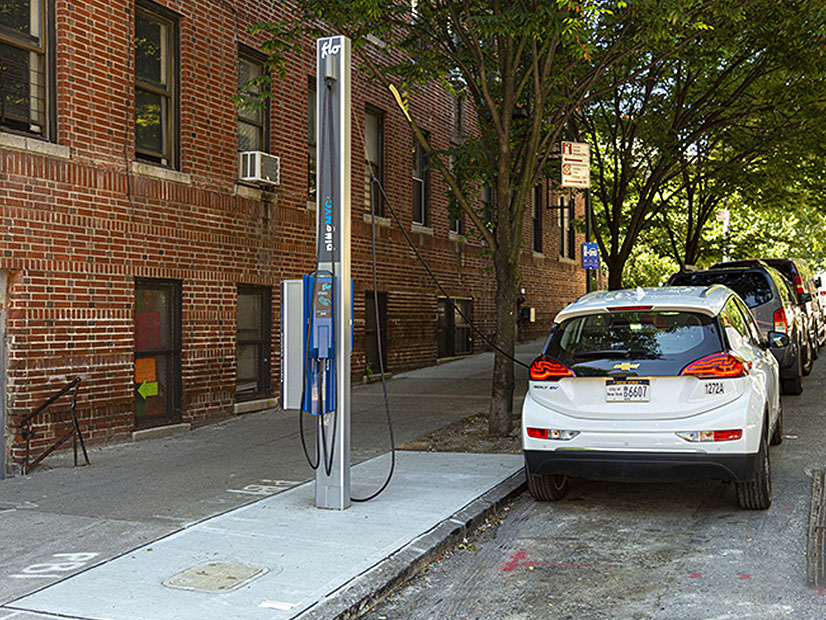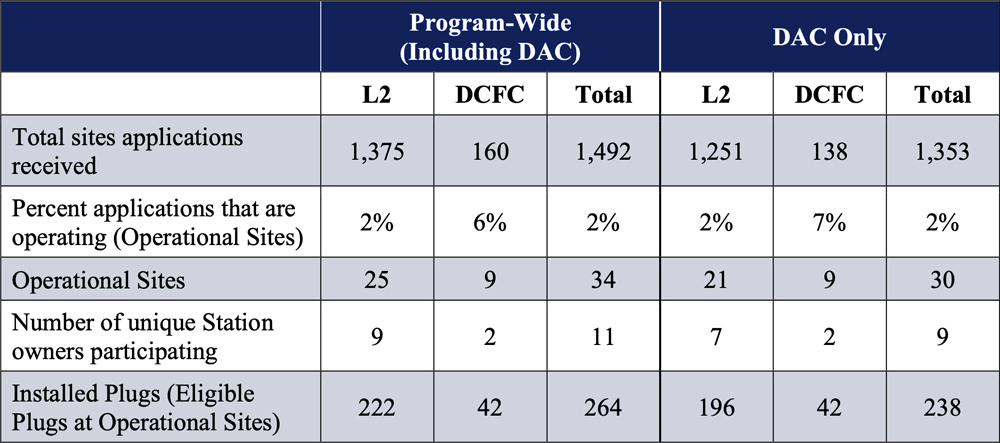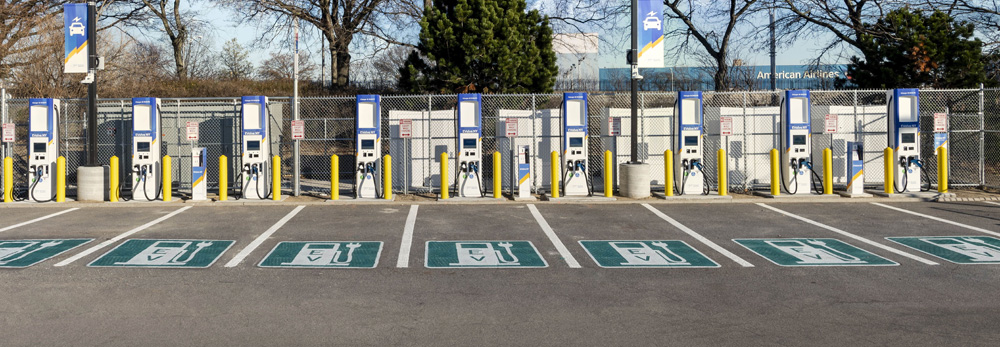
New York’s investor-owned utilities have seen a slow rollout of EV fast-charging stations under the state’s $701 million incentive program to build 50,000 such stations by 2025, according to reports filed with state regulators this month (18-E-0138).
Con Edison (NYSE: ED) reported 34 EV charging sites participating in its incentivized infrastructure program last year, including 25 Level 2 (L2) charging stations and nine direct current fast charging (DCFC) stations, collectively representing just 2% of the total 1,492 site applications received by the utility.
 EV Make-Ready Program 2021 participation in Con Edison territory, including for disadvantaged communities (DACs). | Con Edison
EV Make-Ready Program 2021 participation in Con Edison territory, including for disadvantaged communities (DACs). | Con Edison
The company’s Orange and Rockland (O&R) subsidiary reported three charging sites operating, or nearly 10% of the 31 total site applications received.
The New York Public Service Commission’s DC fast charger order of 2019 established a per-plug incentive program to encourage development of DCFC stations and directed the state’s utilities to file detailed annual reports on the buildout. Similarly, the PSC’s make-ready order of 2020 established a program to encourage development of L2 and DC fast chargers throughout the state, providing incentives to offset the utility and customer capital costs of eligible charging infrastructure.
Customer Benefits
The commission last November issued its EV infrastructure order approving tariff changes to fund the make-ready program that incentivizes utilities and charging port developers to site EV charging infrastructure in places that best benefit drivers.
The PSC allocated a minimum of $206 million toward equitable access and benefits for low-income and disadvantaged communities, where EV charging ports are eligible for an incentive supporting up to 100% of site preparation costs.
The commission also directed the utilities to file detailed annual reports on these programs and to combine their make-ready program reports with their DC fast charger reports. The joint utilities hired Atlas Public Policy to serve as their common third-party contractor to help prepare the annual reports.
The New York Power Authority is dedicating $250 million through 2025 to its related EVolve NY program, which is installing fast chargers throughout the state, including a recently completed 10-charger site at JFK Airport.
 The New York Power Authority is spending $250 million through 2025 on the EVolve NY program to install fast chargers throughout the state, including a 10-charger site at JFK Airport. | NYPA
The New York Power Authority is spending $250 million through 2025 on the EVolve NY program to install fast chargers throughout the state, including a 10-charger site at JFK Airport. | NYPA
In announcing a state-sponsored EV test track at the New York International Auto Show in April, NYPA Interim CEO Justin E. Driscoll said, “We will soon have 100 fast chargers strategically located throughout the state, including at airports, municipal and private parking lots and convenience store locations.”
Con Edison and O&R filed participants’ charging customer fee structures, charging revenue and operating cost data as collected by third-party data aggregator Atlas Public Policy, but confidentially, with relevant parts redacted.
Con Edison said 19 sites did not report their fee structure after at least four outreach attempts by Atlas and Con Edison to collect data, and four sites did not report valid operating costs after at least four outreach attempts.
Con Edison said it will continue to work with participants who are not currently reporting some or all data to bring them into compliance with the reporting requirements of the PSC’s order.
Central Hudson reported 5% of applications having matured into operational stations, with 16 L2 chargers and 21 DCFC stations working as of Dec. 31, 2021.
National Grid (NYSE: NGG) reported 431 applications received for its Niagara Mohawk Power subsidiary, of which 108 (25%) matured into operating stations, or paid projects, in 2021, including a total of four DCFC stations.
Avangrid (NYSE: AGR) subsidiaries New York State Electric and Gas (NYSEG) and Rochester Gas and Electric (RG&E) reported separately, with NYSEG reporting 21 charging stations operating out of 81 applications, including one DCFC station. RG&E reported no DCFC stations operating and 18 L2 stations operating out of a total of 78 applications.
Billing Details
As directed by the commission, all IOUs exempt from the EV surcharge the portion of load served under the Excelsior Jobs Program, which provides a state tax credit of 6.85% of wages per new job created.
Central Hudson includes cost recovery for the EV infrastructure surcharge from non-demand customers under the category of “miscellaneous charges,” with the combined amount shown as one line item on both regular and demand-billed customers’ bills.
According to NYSERDA, the demand charge is a monthly fee that customers pay as part of the cost of maintaining the electric utility’s infrastructure required to deliver electricity to the building or site. For large commercial or industrial customers, demand charges make up a sizable portion of their utility bill, with the amount based on peak energy use measured in kilowatts.
Con Edison is including its EV surcharge in the “monthly adjustment clause” line item on customers’ bills and collecting the surcharge $1/month basis for NYPA customers. O&R includes the surcharge in its “energy cost adjustment” line item.
National Grid includes the EV surcharge in the delivery rate line item on customer bills, while NYSEG and RG&E add it to their respective “transition charge surcharge” line items on customer bills.
